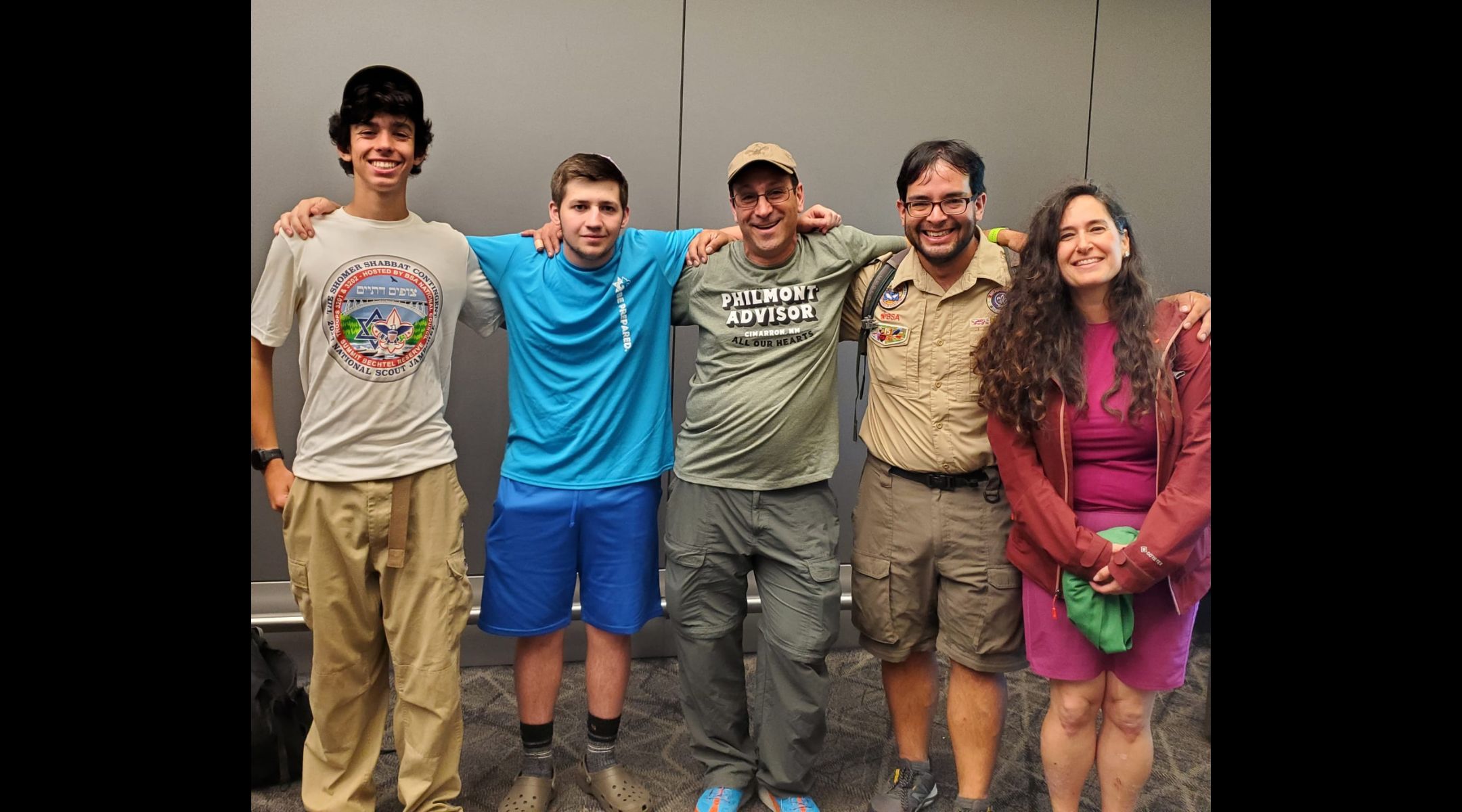These Jewish Boy Scouts saved a man’s life on the flight home from a 100-mile mountain trek
For the teens, the episode on the airplane epitomized what they had joined the Boy Scouts to do

Ariel Yaron (left), Moshe Grimaldi (second from left), Evan Gilder (center) were among five members of a Jewish contingent of Boy Scouts who participated in a CPR rescue aboard a flight to New York on July 11, 2024. (Courtesy Evan Gilder)
(JTA) — Earlier this month, a group of 10 Jewish Boy Scouts hiked more than 100 miles in New Mexico, but the trek wasn’t the most intense part of their trip. That came on the plane ride home, when two of the scouts and their adult staff members saved a man’s life.
The two scouts — Moshe Grimaldi, 17, and Ariel Yaron, 16 — along with their advisor, Evan Gilder, adult leader on the trek Joel Shuart, and nurse practitioner Rachel Travis, who had traveled with the group, performed CPR on an elderly passenger who had gone into cardiac arrest until his heart began to beat again.
The grueling hike, organized annually by a Jewish scouting organization, allows Jewish scouts to participate in the movement’s activities while observing halacha, or Jewish law. For the teens, the episode on the airplane epitomized what they had joined the Boy Scouts to do: model upstanding behavior as well as Jewish values.
“Obviously one of the greatest mitzvot in Judaism is pikuach nefesh,” Yaron told JTA, referring to the principle of saving a life, which is paramount in Jewish law. “So that’s as pikuach nefesh as it gets.”
The backpacking trip, organized by the National Jewish Committee on Scouting at the Philmont Scout Camp, took the scouts on a path through the Rocky Mountains, where, according to a description of the hike, they panned for gold, shot rifles and raced burros. They also observed Shabbat, kept kosher and prayed every day. According to a 2015 article in Jewish Action, an Orthodox Union magazine, there were some 840 Shabbat-observant Jews among the more than 1 million Cub and Boy Scouts nationally.
On the July 11 flight to New York’s LaGuardia Airport, when the passenger went into cardiac arrest, the two staff members rushed to the front of the plane and began conducting chest compressions. Recognizing that they would need more hands on deck, Gilder called Grimaldi and Yaron to join, and they performed CPR for 45 minutes until a pulse was detected again, with the two teens alternating performing cycles of compressions lasting about two minutes. Other volunteers aboard the plane assisted in providing air to the patient, administering three EpiPens and other medications, and inserting intravenous fluids.
The plane was rerouted to Pittsburgh, where the patient was immediately taken to a hospital with his family.
“Usually in movies, it’s just like, one guy, he goes for 20 minutes while they call the cops or whatever. But in reality, CPR is very exhausting,” Yaron said. “I mean, I’m an athlete and I’m relatively young. But for any other guy, like your average Joe doing CPR, it’s difficult.”
Grimaldi, currently a lifeguard at a Boy Scouts camp in upstate New York, said the experience was “surreal.” But he said his multiple CPR and first aid trainings, both as a scout and a lifeguard, meant he was prepared.
“I was very nervous in the moment, but it didn’t stop me from just getting up and doing what I needed to,” Grimaldi told the Jewish Telegraphic Agency. “The amount of relief I had when I realized that he left the plane and he had a pulse — that was just incredible.”
Grimaldi is nearly at Eagle Scout status, the movement’s highest echelon, and has melded Jewish service with his scouting work. His final service project was cataloging graves at a historical Jewish cemetery in Yonkers, New York.
Yaron, an incoming junior at Fiorello H. LaGuardia High School, the performing arts school in New York City, also sees scouting as a chance to meet other Jewish teens. He learned CPR in school and is also an Eagle Scout.
“It makes me grateful for the life that I get to live now, and makes me realize how important it is to take the most of the moment and to care for yourself and to care for others,” he said. “Like the Boy Scout motto: Always be prepared, to be ready for whatever life gives you.”












